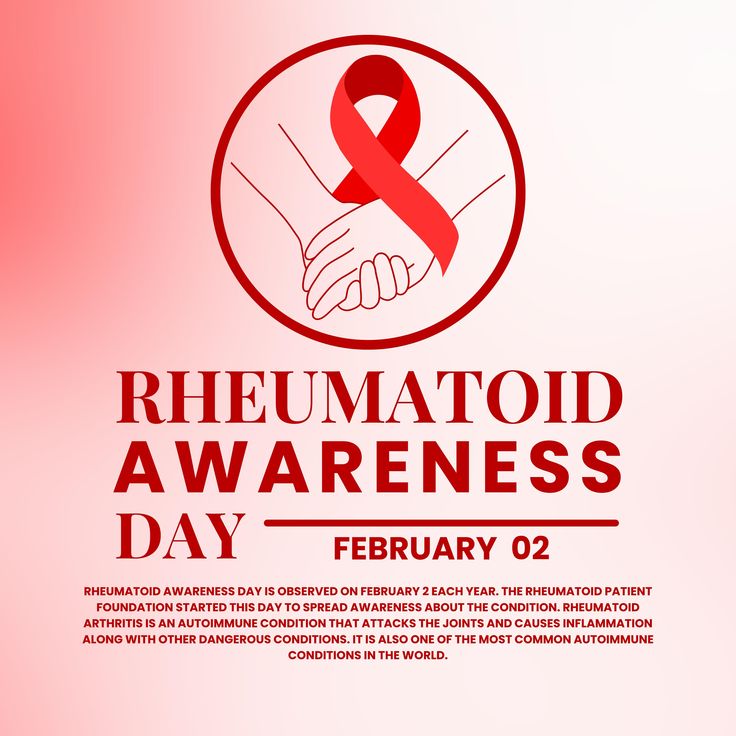Rheumatoid Awareness Day: History, Significance & Daily Life Impacts
What is Rheumatoid Awareness Day?
Rheumatoid Awareness Day, observed annually on February 2nd, is dedicated to raising awareness about Rheumatoid Arthritis (RA), an autoimmune disease that affects millions worldwide. This day sheds light on the struggles of individuals living with RA and emphasizes the need for better treatments, early diagnosis, and public understanding of this chronic condition.
Founded by the Rheumatoid Patient Foundation (RPF) in 2013, Rheumatoid Awareness Day aims to counter misconceptions about RA and advocate for increased research, funding, and patient support.
History of Rheumatoid Awareness Day
The Rheumatoid Patient Foundation established Rheumatoid Awareness Day to highlight the challenges of RA, which is often misunderstood as just a form of arthritis. Unlike osteoarthritis, which results from wear and tear, RA is an autoimmune disease where the immune system mistakenly attacks healthy joint tissues, leading to inflammation, pain, and long-term joint damage.
By designating February 2nd as Rheumatoid Awareness Day, RPF has created a platform for individuals, healthcare professionals, and researchers to come together in advocating for more comprehensive medical support and awareness efforts.
Significance of Rheumatoid Awareness Day
Why Is This Day Important?
- Raises Awareness – Educates the public about RA and its impact on daily life.
- Encourages Early Diagnosis – Highlights the importance of detecting RA early to prevent severe joint damage.
- Supports Research & Innovation – Advocates for advancements in RA treatments and potential cures.
- Empowers Patients – Provides resources and support for individuals battling RA.
- Breaks Misconceptions – Differentiates RA from common arthritis and educates people on its systemic effects.
Daily Life Impacts of Rheumatoid Arthritis
Rheumatoid Arthritis is more than just joint pain. It can affect multiple aspects of daily life, including:
- Chronic Fatigue – Many RA patients experience constant exhaustion, making everyday tasks difficult.
- Mobility Issues – Joint stiffness and swelling can restrict movement and make simple activities challenging.
- Mental Health Effects – The stress of chronic pain often leads to anxiety and depression.
- Workplace Challenges – Many individuals with RA struggle with work productivity and job retention.
- Financial Burden – Medical costs for treatments, therapies, and medications can be overwhelming.
How to Observe Rheumatoid Awareness Day
There are several ways to participate in and spread awareness about RA on this important day:
- Share Information – Post facts, stories, and resources on social media using hashtags like #RheumatoidAwarenessDay.
- Wear Blue & Purple – Show support by wearing colors associated with RA awareness.
- Support RA Charities – Donate to organizations dedicated to RA research and patient support.
- Attend Awareness Events – Participate in webinars, community talks, and health fairs.
- Encourage Early Check-Ups – Promote the importance of early diagnosis and medical consultation.
Interesting Facts About Rheumatoid Arthritis
- RA affects women more than men, with nearly three times as many female patients.
- Unlike osteoarthritis, RA can affect the lungs, heart, and other organs, making it a systemic disease.
- The exact cause of RA is unknown, but genetic and environmental factors play a role.
- Early intervention with disease-modifying antirheumatic drugs (DMARDs) can slow down joint damage.
- Cold weather can worsen RA symptoms, as many patients experience increased stiffness and pain.
FAQs About Rheumatoid Awareness Day
1. When is Rheumatoid Awareness Day celebrated?
It is observed annually on February 2nd.
2. Who started Rheumatoid Awareness Day?
It was established by the Rheumatoid Patient Foundation (RPF) in 2013.
3. How can I support people with RA?
You can offer emotional support, educate yourself about RA, promote awareness, and donate to RA-focused organizations.
4. Is Rheumatoid Arthritis curable?
Currently, there is no cure for RA, but early treatment and proper management can help control symptoms and improve quality of life.
5. What are the early symptoms of RA?
Common early signs include joint stiffness, swelling, fatigue, and persistent pain, particularly in the hands and feet.
Wishing Someone on Rheumatoid Awareness Day
If you know someone affected by RA, sending a thoughtful message can mean a lot. Here are some ideas:
- “Your strength in facing RA is truly inspiring. Wishing you hope and wellness on Rheumatoid Awareness Day.”
- “May this day bring more awareness and support for those battling RA. You are not alone!”
- “Sending you strength, comfort, and positivity on Rheumatoid Awareness Day. Keep fighting!”
Why Rheumatoid Awareness Day Is Important to Society
RA is often overlooked, but it affects over 18 million people worldwide. Rheumatoid Awareness Day brings much-needed attention to this chronic disease, fostering empathy, research funding, and better treatment options. It encourages open conversations about RA, helping patients feel seen, understood, and supported.
Final Thoughts Rheumatoid Awareness Day is not just about recognizing the condition—it’s about supporting those who live with RA every day. Whether by educating yourself, advocating for research, or simply offering a kind word to someone with RA, your actions can make a difference. Let’s use this day to push for a future where RA is better understood, managed, and eventually cured.










